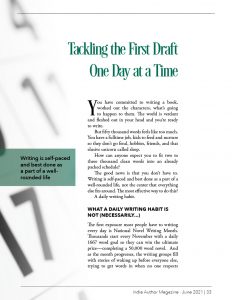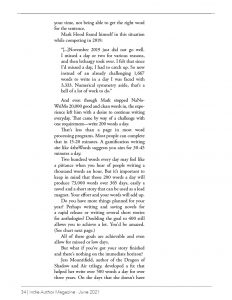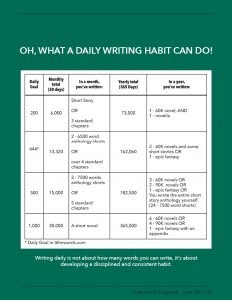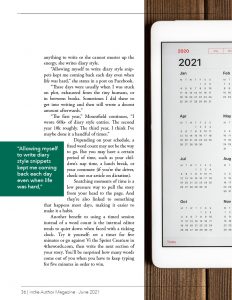
You have committed to writing a book, worked out the characters, what’s going to happen to them. The world is verdant and fleshed out in your head and you’re ready to write.
But fifty thousand words feels like too much. You have a fulltime job, kids to feed and nurture so they don’t go feral, hobbies, friends, and that elusive unicorn called sleep.
How can anyone expect you to fit two to three thousand clean words into an already packed schedule?
The good news is that you don’t have to. Writing is self-paced and best done as a part of a well-rounded life, not the center that everything else fits around. The most effective way to do this?
A daily writing habit.
What a Daily Writing Habit is NOT (necessarily...)
The first exposure most people have to writing every day is National Novel Writing Month. Thousands start every November with a daily 1667 word goal so they can win the ultimate prize—completing a 50,000 word novel. And as the month progresses, the writing groups fill with stories of waking up before everyone else, trying to get words in when no one respects your time, not being able to get the right word for the sentence.
Mark Hood found himself in this situation while competing in 2019: “[...]November 2019 just did not go well. I missed a day or two for various reasons, and then lethargy took over. I felt that since I’d missed a day, I had to catch up. So now instead of an already challenging 1,667 words to write in a day I was faced with 3,333. Numerical symmetry aside, that’s a hell of a lot of work to do.”
And even though Mark stopped NaNo-WriMo 20,000 good and clean words in, the experience left him with a desire to continue writing everyday.
That came by way of a challenge with one requirement—write 200 words a day.
That’s less than a page in most word processing programs. Most people can complete that in 15-20 minutes. A gamification writing site like 4theWords suggests you aim for 30-45 minutes a day.
Two hundred words every day may feel like a pittance when you hear of people writing a thousand words an hour. But it’s important to keep in mind that those 200 words a day will produce 73,000 words over 365 days, easily a novel and a short story that can be used as a lead magnet. Your effort and your words will add up.
Do you have more things planned for your year? Perhaps writing and saving novels for a rapid release or writing several short stories for anthologies? Doubling the goal to 400 still allows you to achieve a lot. You’d be amazed.
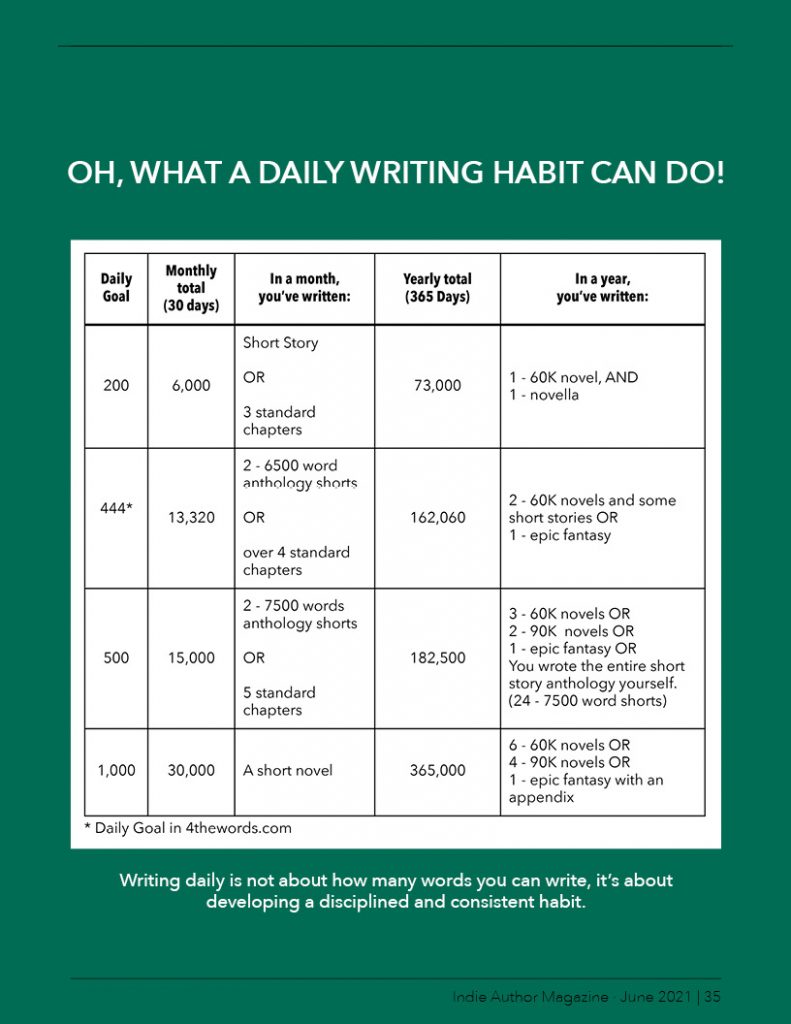
All of these goals are achievable and even allow for missed or low days.
But what if you’ve got your story finished and there’s nothing on the immediate horizon?
Jess Mountifield, author of the Dragon of Shadow and Air trilogy, developed a fix that helped her write over 500 words a day for over three years. On the days that she doesn’t have anything to write or she cannot muster up the energy, she writes diary style. “Allowing myself to write diary style snippets kept me coming back each day even when life was hard,” she states in a post on Facebook.
“These days were usually when I was stuck on plot, exhausted from the tiny humans, or in between books. Sometimes I did these to get into writing and then still wrote a decent amount afterwards.”
“The first year,” Mountfield continues, “I wrote 60k+ of diary style entries. The second year 10k roughly. The third year, I think I've maybe done it a handful of times.”
Depending on your schedule, a fixed word count may not be the way to go. But you may have a certain period of time, such as your children's nap time, a lunch break, or your commute (if you’re the driver, check out our article on dictation).
Snatching moments of time is a low pressure way to pull the story from your head to the page. And they’re also linked to something that happens most days, making it easier to make it a habit.
Another benefit to using a timed session instead of a word count is the internal editor tends to quiet down when faced with a ticking clock. Try it yourself: set a timer for five minutes or go against Vi the Sprint Creature in 4thewords.com, then write the next section of your story. You’ll be surprised how many words come out of you when you have to keep typing for five minutes in order to win.
What a daily writing habit IS - consistency.
Writing daily is not about how many words you can write, it’s about developing a disciplined and consistent habit.
The goal of this habit is not to rack up high numbers. The aim is to write a little bit until you finish your chapter, then the next, until you have a complete novel.
Starting out, a full novel can seem like a daunting task, but with a daily writing habit, it doesn’t have to be. Finish your rough draft one day at a time, and watch how your word count grows.

